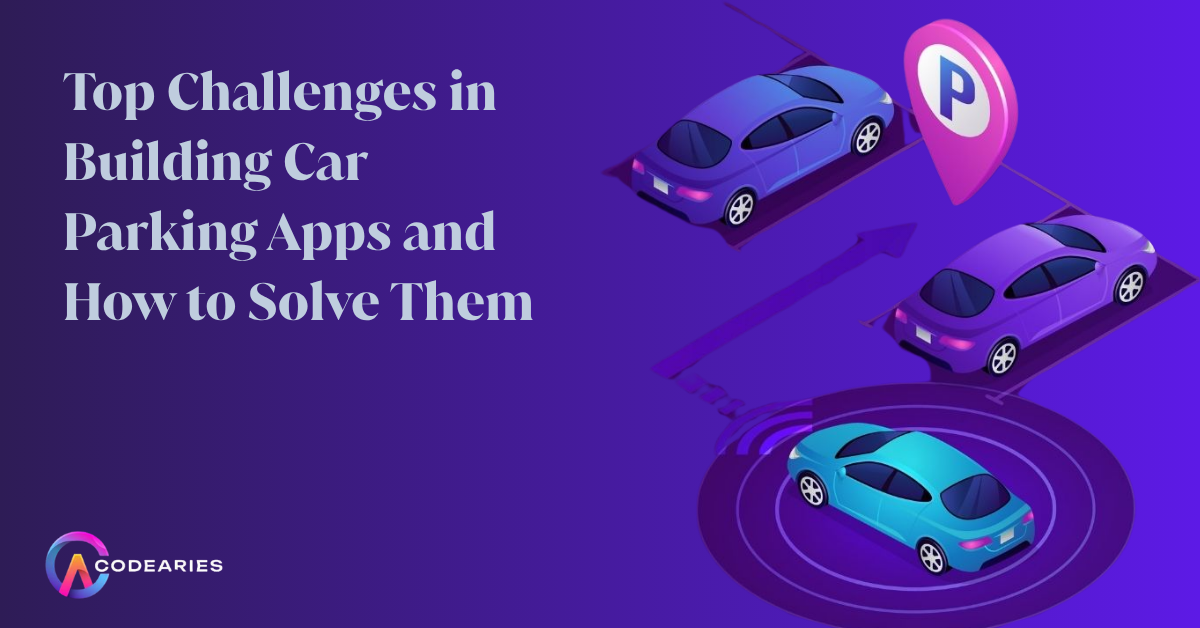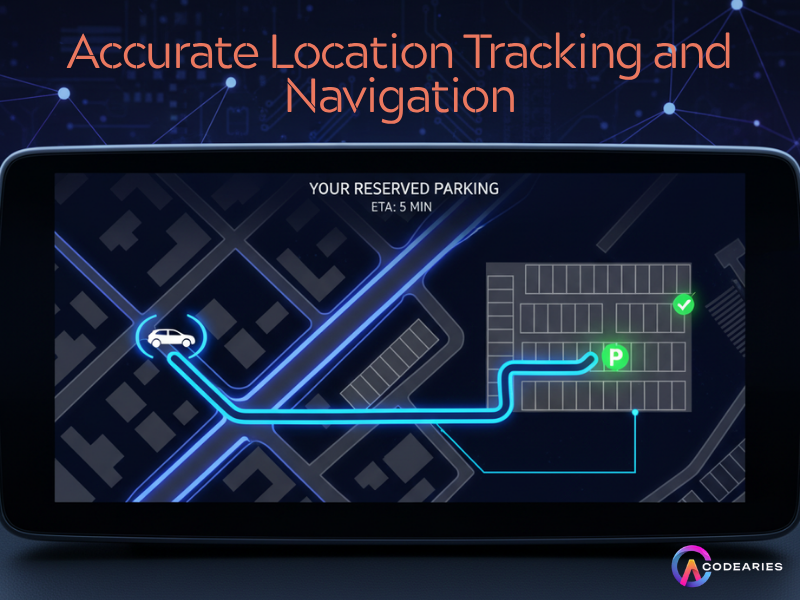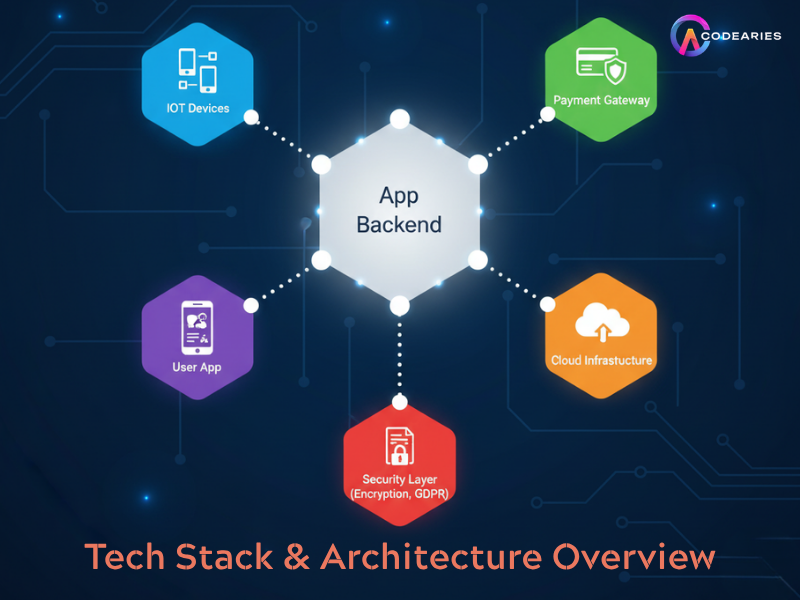
Urban centers worldwide face increasing challenges related to parking, including congestion, inefficiency, and user frustration. Car parking apps have emerged as valuable tools, helping customers find, reserve, and pay for spots easily. However, developing a successful car parking app comes with technical, operational, and user experience hurdles.
As cities become smarter and parking demand rises, the apps that excel are those created with a strong understanding of these challenges and strategies to address them. In this blog, we will look at the main issues in car parking app development and offer practical solutions. Learn how Codearies supports enterprise grade app projects that enhance user satisfaction and optimize parking resources.
1. Real Time Parking Space Availability
The Challenge:
Maintaining accurate and timely spot availability data is essential yet complex. Sensors may fail, integration delays can occur, and manual updates might be inconsistent. Incorrect information leads to user frustration and inefficiency.
Solutions:
- Deploy Reliable IoT Sensors: Use a combination of ultrasonic, camera based, and embedded sensors with backup systems.
- Real Time Data Integration: Create low latency APIs that instantly sync sensor data with the app backend.
- Crowdsourcing & User Feedback: Add user reports to sensor data to identify discrepancies quickly.
- AI & Predictive Analytics: Use historical data and AI to predict availability when direct sensing is not possible.
2. Seamless and Secure Payments
The Challenge:
Users want easy payments via cards, wallets, or subscription models. Managing various payment methods securely while meeting regulatory requirements is not easy.
Solutions:
- PCI DSS Compliance: Embed stringent payment security standards.
- Multiple Payment Gateway Integration: Include popular global and local options for user convenience.
- Tokenization & Secure Storage: Protect payment information using tokens instead of sensitive data.
- Dynamic Pricing Models: Apply surge, membership, or discount pricing as needed.
3. Accurate Location Tracking and Navigation
The Challenge:
For drivers, efficiently finding and reaching their reserved spot depends on precise geolocation and routing that considers obstacles like construction and traffic.
Solutions:
- GPS + Wi-Fi + BLE Hybrid Positioning: Enhance accuracy indoors and outdoors.
- Live Traffic Data Integration: Adjust recommended routes dynamically.
- Turn by turn Navigation: Use detailed mapping SDKs to guide drivers step by step.
- AR Overlays: Offer Augmented Reality views for pinpointing parking spots.

4. User Friendly Design & Onboarding
The Challenge:
Apps that are cluttered with features or complicated workflows can drive away casual users. A simple, intuitive design is critical for adoption.
Solutions:
- Progressive Disclosure: Show features contextually as needed.
- Streamlined Booking Flows: Require minimal taps from app launch to reservation.
- Clear Pricing and Policies: Transparency builds trust.
- Multi language and Accessibility Support: Cater to diverse city populations inclusively.
5. Integration with Existing Infrastructure
The Challenge:
Parking operators might use outdated hardware or software that is incompatible or undocumented, making integration harder.
Solutions:
- Custom Middleware: Create translation layers between your app and operator systems.
- API First Approach: Secure operator cooperation upfront for effective API access.
- Modular Architecture: Enable easy integration of new locations with different technology setups.
6. Data Privacy and Security
The Challenge:
Apps collect sensitive personal, payment, and location data, which requires strong security and compliance with local laws like GDPR or CCPA.
Solutions:
- Data Encryption: At rest and in transit.
- Consent Management: Allow users to control their preferences easily.
- Regular Security Audits: Proactively detect vulnerabilities.
- Minimal Data Retention: Only keep what is necessary for operations.
7. Scalability and Performance
The Challenge:
Apps must handle surges, commuter peaks, events, without slowdowns or crashes.
Solutions:
- Cloud Native Backends: Use auto scaling and load balancing.
- Microservices Architecture: Decouple components for resilience.
- Edge Computing: Reduce latency by processing data closer to users.
- Stress Testing & Monitoring: Continuous performance tuning.
How Codearies Elevates Car Parking Apps
At Codearies, we focus on creating strong, scalable, and user friendly car parking apps that tackle these challenges directly.
Our Strengths:
- IoT & Sensor Integration for dependable real time occupancy.
- Secure, flexible payment gateways that ensure smooth user experiences.
- Multi layered geolocation and AR based navigation support.
- Intuitive UI/UX design tailored to diverse user bases.
- Middleware and API development that connects new and existing systems.
- Comprehensive data privacy and security integrated into our design.
- Cloud infrastructure engineering that allows for efficient scaling and uptime.
- Comprehensive analytics dashboards empowering operators.
Partner with Codearies to create innovative parking solutions that satisfy drivers, optimize resources, and support smarter cities.

Frequently Asked Questions
How do you ensure real time parking data accuracy?
We combine IoT sensors, user crowdsourcing, and AI prediction to keep availability data accurate and reliable.
What payment methods can you integrate?
Our platform supports global standards, including cards, wallets, UPI, subscriptions, and emerging options, with built in PCI compliance.
Can you integrate with existing parking hardware/software?
Yes, we develop custom middleware and APIs to connect smoothly with various operator systems.
How do you approach app user experience design?
We prioritize simplicity, transparency, accessibility, and contextual feature exposure to ensure high adoption and satisfaction.
What is your typical delivery timeline for a parking app?
Depending on features and integrations, projects typically take 4 to 8 months for the MVP, with ongoing support for scaling.
For business inquiries or further information, please contact us at


